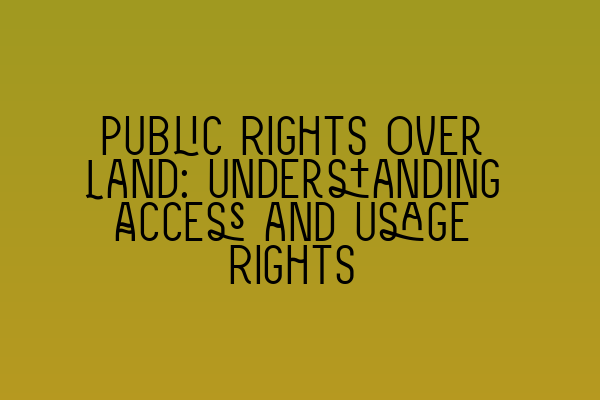Public Rights Over Land: Understanding Access and Usage Rights
When it comes to land ownership and usage, there are various legal rights that individuals and the public at large may have. These rights, known as public rights over land, play a crucial role in ensuring fair and equitable access to and use of land. In this article, we will explore the concept of public rights over land and provide an overview of the different types of access and usage rights that exist.
Understanding Public Rights Over Land
Public rights over land refer to the legal rights that are granted to individuals or groups to access and use specific areas of land. These rights are typically granted either by law or by long-standing custom and can vary depending on the jurisdiction and specific circumstances. Public rights over land are aimed at balancing the interests of landowners with the wider public interest in accessing and using land for various purposes.
Public rights over land can take many forms, including rights of way, rights to fish or hunt, and rights to use certain areas for recreational purposes. These rights are often classified as either prescriptive rights or statutory rights.
Prescriptive Rights
Prescriptive rights are those that are acquired after a specific period of continuous and uninterrupted use of the land without the consent of the landowner. These rights are based on the legal principle of prescription, which allows individuals to claim certain rights over land if they have used it without interruption for a prescribed period of time – typically 20 years or more.
An example of a prescriptive right is a right of way – a legal right to pass through another person’s land. If a person has been using a particular path across someone else’s land openly and without interruption for 20 years or more, they may acquire a prescriptive right of way.
Statutory Rights
Statutory rights, on the other hand, are those that are granted by legislation. These rights are typically established through statutes or acts of parliament and are enshrined in law. Statutory rights can cover a wide range of access and usage rights over land.
For example, the Countryside and Rights of Way Act 2000 in England and Wales grants individuals the right to access certain areas of privately-owned land, known as “Open Access Land.” This legislation ensures that the public has the right to walk, cycle, and enjoy other recreational activities on designated areas of land.
Public Rights Over Land and Land Law
Understanding public rights over land is essential for property law practitioners as it impacts a wide range of legal matters. Whether you are involved in conveyancing, representing landowners, or advising on public access and usage rights, a solid understanding of this area of law is crucial.
If you are preparing for the SQE (Solicitors Qualifying Examination) in property law or land law, it is important to familiarize yourself with the concept of public rights over land. The SQE assesses candidates’ knowledge and understanding of various areas of law, including property law, and being well-versed in public rights over land will undoubtedly strengthen your chances of success.
At SQE Property Law & Land Law, we offer comprehensive preparation courses for the SQE 1 and SQE 2 exams. Our courses are designed to help aspiring solicitors develop a deep understanding of property law and land law, including topics related to public rights over land.
If you are looking to enhance your knowledge and prepare effectively for the SQE exams, we recommend checking out our SQE 1 Practice Exam Questions and SQE 1 Practice Mocks FLK1 FLK2 for comprehensive practice and revision. Additionally, our SQE 2 Preparation Courses and SQE 1 Preparation Courses will provide you with the necessary guidance and resources to excel in the SQE exams.
Conclusion
Public rights over land are essential for ensuring fair and equitable access and usage of land. Whether acquired through prescription or granted by legislation, these rights play a crucial role in balancing the interests of landowners with the wider public interest. Understanding public rights over land is vital for property law practitioners and those preparing for the SQE exams. By familiarizing yourself with this concept and accessing relevant study materials and resources, you can enhance your knowledge and improve your chances of success.
For more information about the SQE exams or our preparation courses, browse our website or get in touch with the team at SQE Property Law & Land Law. We are here to support you on your journey to becoming a qualified solicitor.
